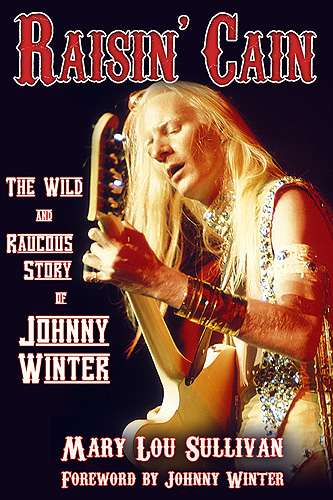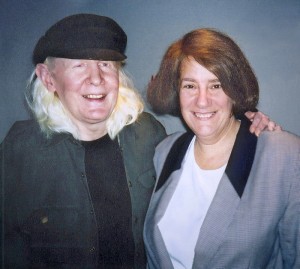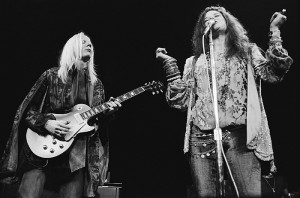 Much like the subject of her book, Raisin’ Cain: The Wild and Raucous Story of Johnny Winter (Backbeat Books, 2010), Mary Lou Sullivan had to take a long road to realize her dream. She first met the famed Texas blues guitarist and singer in 1984, but it took nearly 20 years before Winter agreed to cooperate on a no-holds-barred biography.
Much like the subject of her book, Raisin’ Cain: The Wild and Raucous Story of Johnny Winter (Backbeat Books, 2010), Mary Lou Sullivan had to take a long road to realize her dream. She first met the famed Texas blues guitarist and singer in 1984, but it took nearly 20 years before Winter agreed to cooperate on a no-holds-barred biography.
With Raisin’ Cain now in its third printing and receiving glowing critical reviews, Sullivan’s persistence has been rewarded with recognition by The Blues Foundation, which will present her with its Keeping the Blues Alive Award for Literature on Feb. 5 in Memphis, during the KBA Awards dinner.
“I was absolutely thrilled when I got the call,” says Sullivan, publicity and marketing manager in UConn’s Center for Continuing Studies. “My goal from day one was to ensure that Johnny’s legacy was captured in his own words in his lifetime. The Keeping the Blues Alive Award is recognition from the blues community that my book and Johnny’s contributions to the blues are now part of blues history.”
The recognition places Sullivan in the company of such previous recipients of the award as the late Robert Palmer, author of Deep Blues and a regular music contributor to The New York Times and Rolling Stone Magazine; Peter Guralnick, author of In Search of Robert Johnson, the landmark two-volume biography of Elvis Presley – Last Train to Memphis: The Rise of Elvis Presley and Careless Love: The Unmaking of Elvis Presley; and Robert Gordon, author of Can’t Be Satisfied: The Life and Times of Muddy Waters, and filmmaker of the PBS American Masters documentary “Can’t Be Satisfied.”

After first meeting Winter when she was a news reporter and radio talk show host in Hartford, Sullivan thought the musician’s story merited a book. But Winter’s manager thought any biography should be postponed until the guitarist, then 41 years-old, could gain wider recognition. She stayed in touch with Winter’s management over the years, and after doing an interview with the musician in 2001, began the process that led to starting work on the book in 2003. Sullivan pursued dozens of original interviews with people from Winter’s past in order to provide an authoritative story.
Winter’s road to fame included a familiar litany of a musician’s life, including losing money to bad management, drug addiction, the struggle for recognition, and a trail of ex-girlfriends.
“There were a couple of times when I got different versions [of stories],” she says. “I wanted to get the story in Johnny’s own words. I spent a year at his house in Connecticut on Saturdays interviewing him. I drank water. He drank vodka. It took a while for him to get comfortable with me. Once he did, he opened up. Johnny’s an honest guy. That’s one of the reasons I wanted to do the biography.”

Throughout his career, Winter performed with such legendary musicians as Janis Joplin, Jimi Hendrix, James Cotton, Willie Dixon, and the performer who most influenced him – Muddy Waters. Eventually Winter was able to fulfill one of his musical dreams by playing with Waters on “Hard Again,” an album he also produced and which won a Grammy Award.
“A Muddy Waters album was the first time he heard a slide guitar. It kind of freaked him out because he couldn’t figure out what was happening,” Sullivan says. “Johnny loved Muddy Waters and wanted to spend time with him. When he was able to produce and play on Muddy’s four albums for the Blue Sky label, it was joyful for everyone.”
She says that while Winter admits to making many mistakes during his life and career, he seems to have found happiness as he enters his 60s.
“It’s hard to characterize him. Is he a saint or a sinner? Who am I to judge? He’s made some choices that weren’t the smartest for him,” she says. “But he’s really happy. God bless him. From the time he was a kid, he thought he was going to be famous. To have that kind of confidence and to just keep at it. I don’t have ‘Johnny fever’ anymore, like I did when I used to see him, but we did get to be good friends.”
Winter wrote the foreword to the book and indicated that he wanted all of his story told, the good and the bad. “Reading this book was emotional – the good stuff was great and the bad stuff was really horrible,” he wrote. “Some of the memories are painful, but I’m glad they’re in the book. To try to whitewash my life would have been horrible, that wouldn’t have been worth reading.”
Sullivan says she is grateful that Winter trusted her to tell his story truthfully.
“It was critical to me to get Johnny’s story in his own words so after he left this Earth it would be an honest account and not be people telling their own story with their own slant,” she says.
Winter continues to perform on recordings and in concert. His latest release is a DVD titled “Johnny Winter Live Through the ’80s,” and he recently completed work as a guest performer on Joe Louis Walker’s latest compact disc, “Blues Conspiracy.” He will perform in Connecticut at the Wolf Den in the Mohegan Sun casino on Jan. 7, at Infinity Hall in Norfolk on Feb. 4, and at Toad’s Place in New Haven on March 4, before completing his American tour and heading to Europe in May.


